|
1 High Street
Dartford
01322 224415
http://royalvictoria.southcoastinns.co.uk/
https://whatpub.com/royal-victoria-bull-hotel
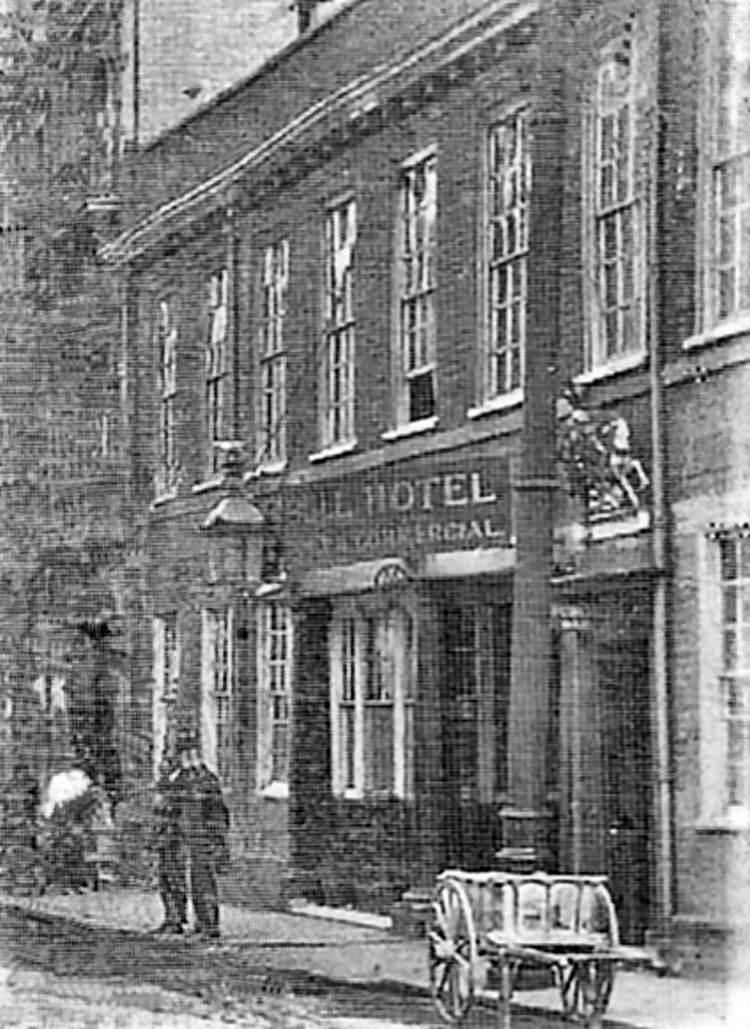
Above photo 1916, kindly sent by Michael Norman. |
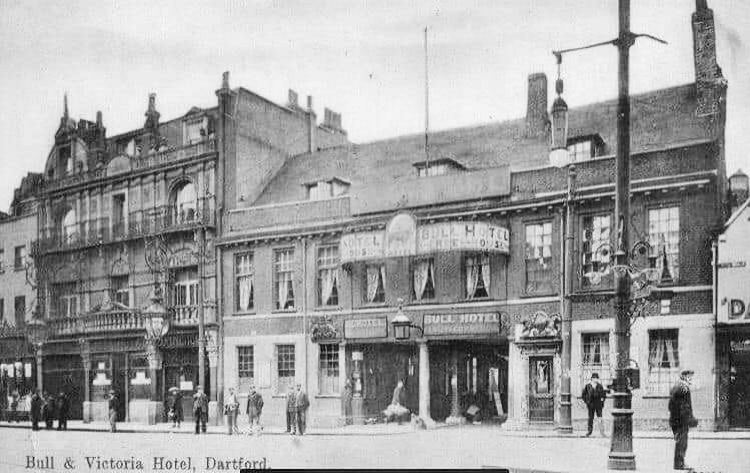
Above postcard, date unknown. |
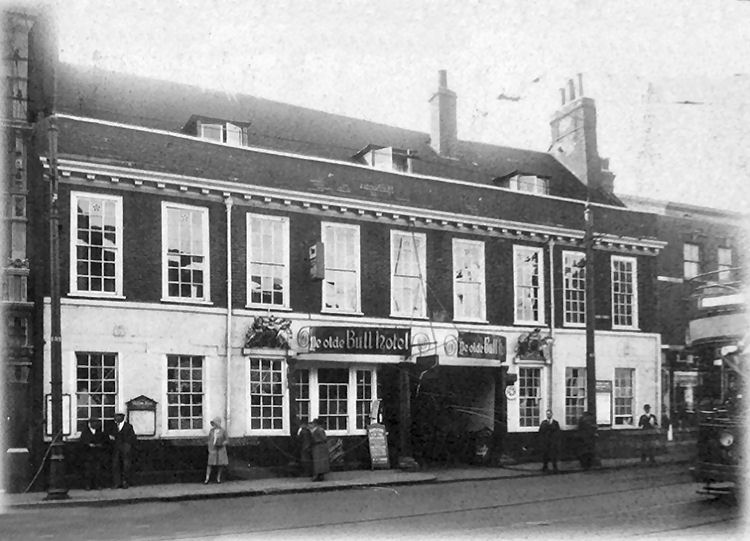
Above photo, date unknown. |
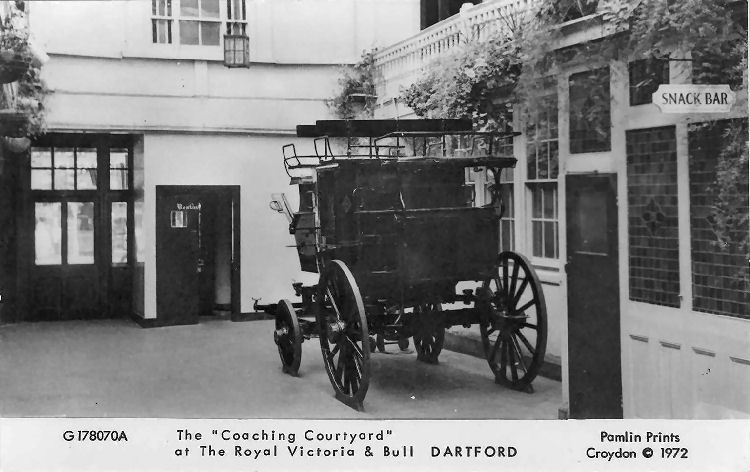
Above postcard, date unknown, kindly sent by Mark Jennings. |
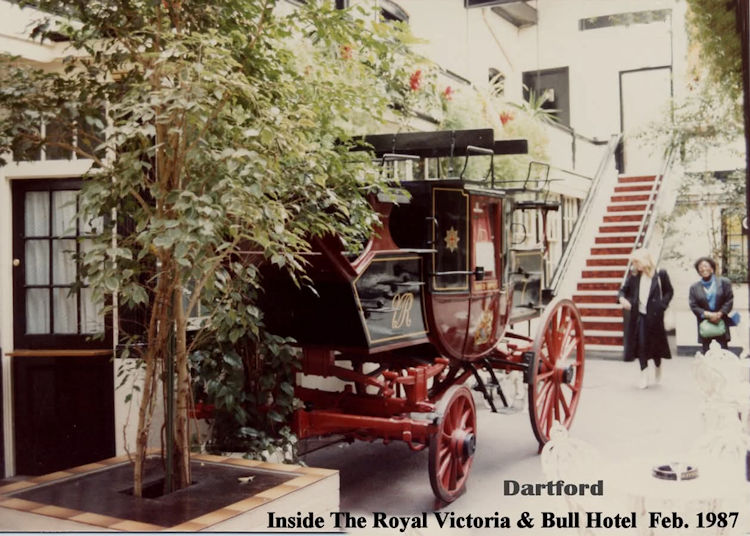
Above photo, showing the inside in 1987. |
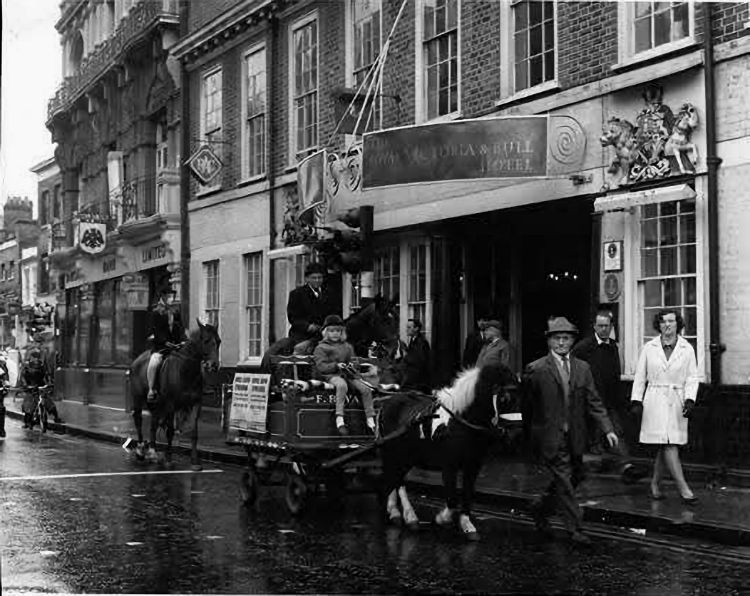
Above photo, date unknown, showing Fred Bevan of Bevan Coal Yard. |
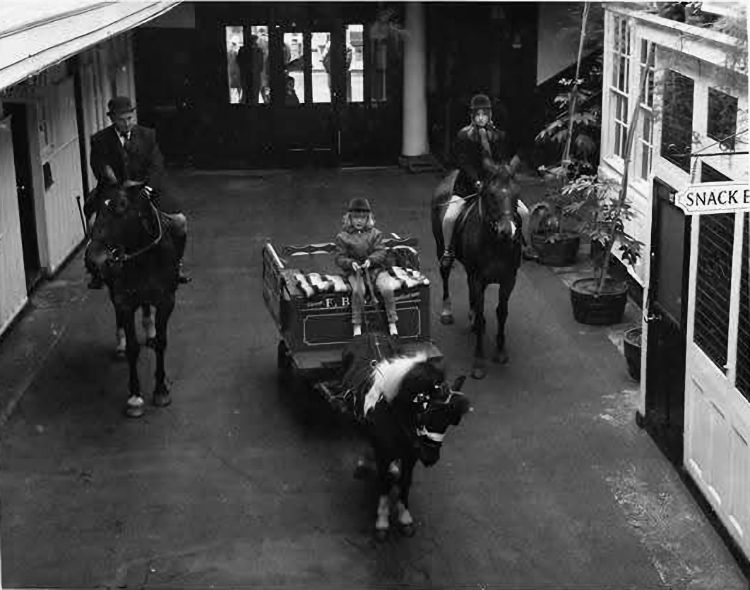
Above photo, date unknown, showing Fred Bevan of Bevan Coal Yard inside. |
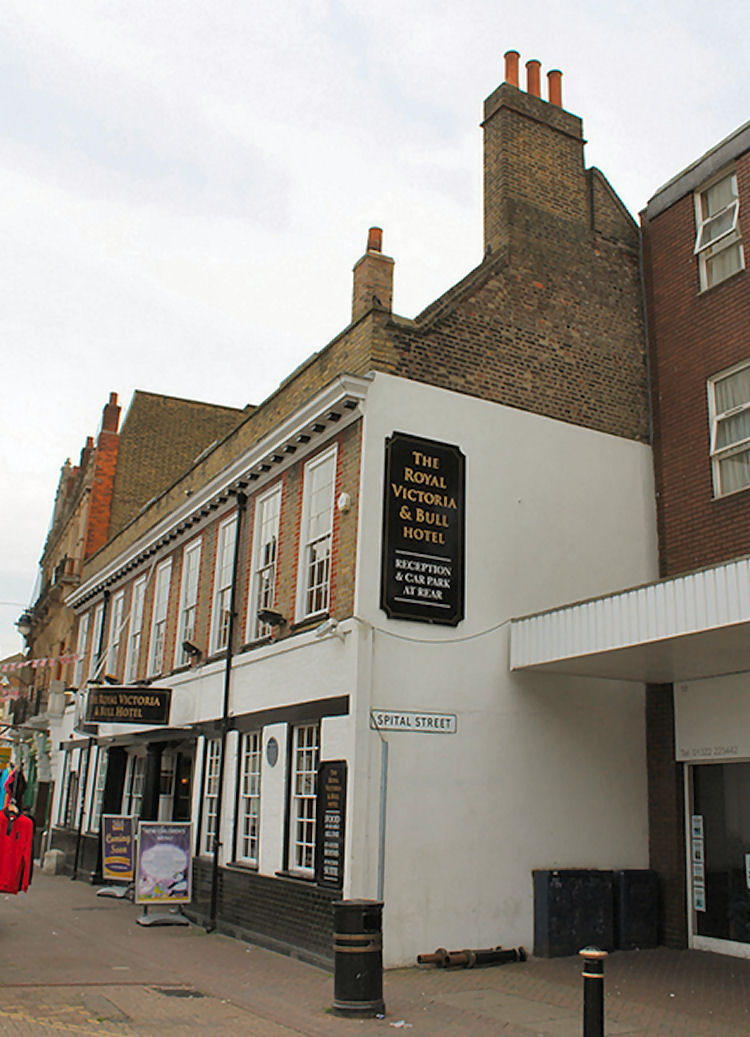
Above photo 1 September 2012, by emdjt42. |
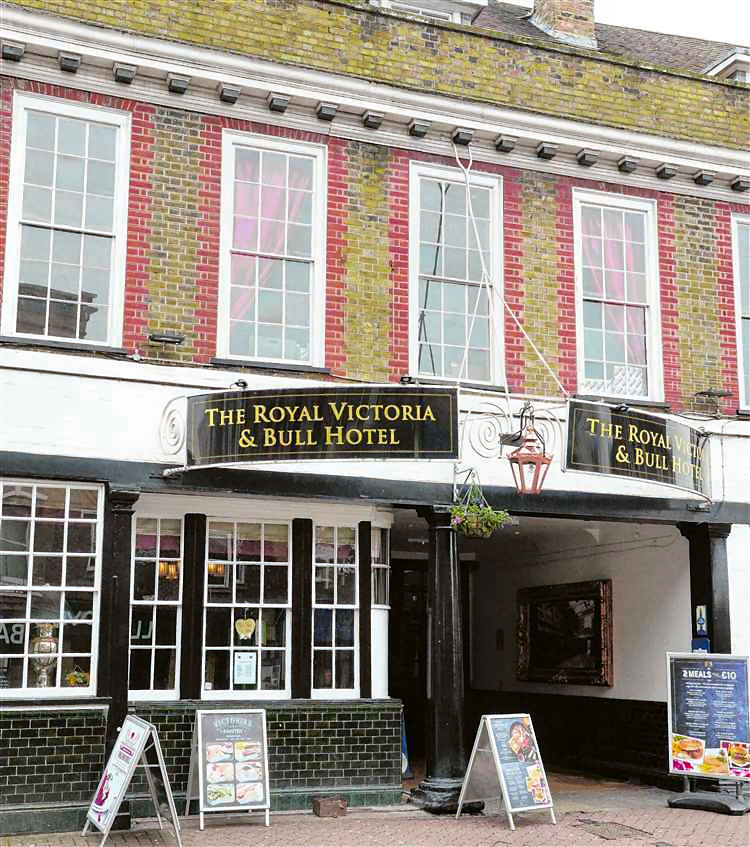
Above photo 2020. |
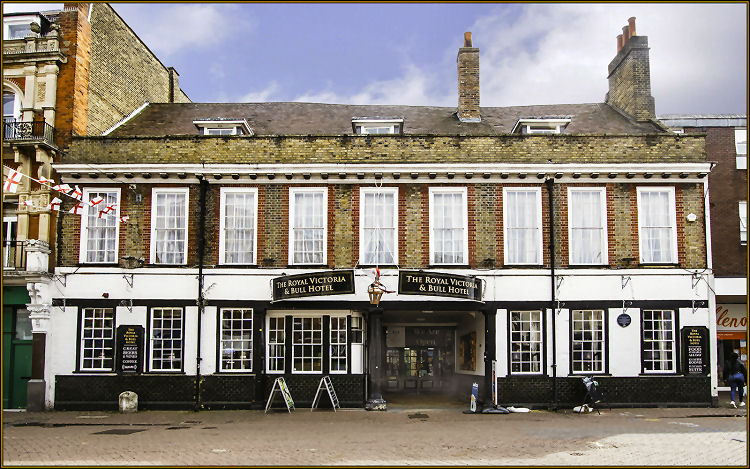
Above photo 2021. |
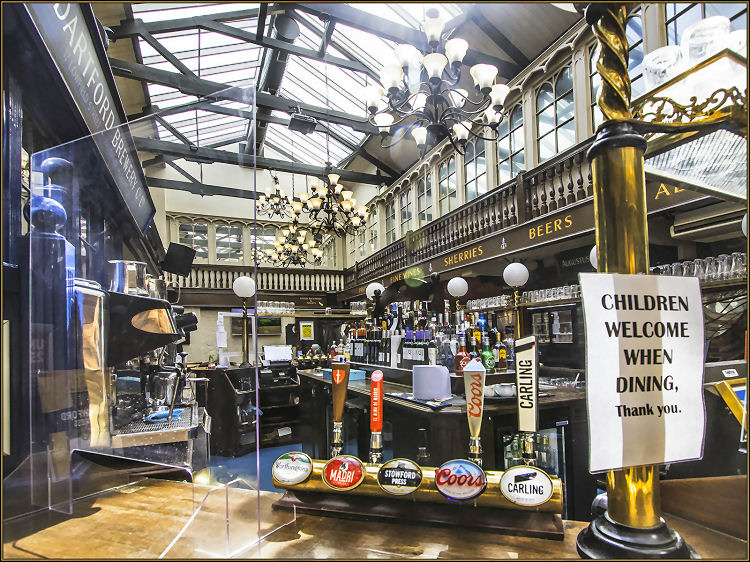
Above photo 2021. |
This is almost certainly Dartford's oldest Inn and was probably owned by
Dartford Priory. The "Bull" in the name refers not to the animal got to a
"bulla" - a seal or papal edict secured by a seal.
It is said that this can be traced back to the 14th century when it was
known as the "Holy Bull," the "Holy Seal" or "Holy Edict." However the original building was rebuilt in 1703
with a gallery overlooking the yard into which the stagecoaches would enter
through an entrance twice as wide as today. The open yard was glazed over by
the landlord in 1826 to provide a sheltered corn exchange and much of that is still in existence today. It has also been known as the
"Bull and Victoria" and eventually gained its Royal prefix, and the two
names reversed in honour of Queen Victoria, but as yet date of that unknown.
Also known as just the "Bull Hotel" this was a Commercial and Family
Hotel and Posting House.
The building began life as a hospice for the Augustinian Priory of
SS Mary and Margaret on Watling Street, and was the first overnight stop for
Canterbury-bound pilgrims from London. It was a busy coaching inn during the
eighteenth century, and in 1775 Dr John Parker was killed by an exploding
carbine there after being cornered by bailiffs seeking to recover his debts.
The verdict was accidental death.
The cattle market was still in existence in the 1950s, when there was
still much space behind it for the cattle market and general open market -
the space is now taken up by a super market, shopping centre and car park.
To the left of the bar there was a well preserved mail coach - this was
moved on a few years ago.
The Dartford Borough Museum also contains information about the Battle
for Bull Centre. There was a clash between the local Salvation Army and town
officials. The area opposite the hotel was traditionally used as a meeting
place for religious and political groups. However, these meetings were ruled
to be causing an obstruction and therefore local religious figures were
imprisoned.
|
Southeastern Gazette, 16 August 1853.
Charles Crane and Benjamin Hollands, of Dartford, were charged
before James ’Espinasse, Esq. (at the rising of the County Court,
held at the Town-hall, on Monday), with stealing several trusses of
hay, belonging to Mr. Rowley Edward Potter, the proprietor of the
"Victoria Hotel," Dartford.
The prisoner Crane’s premises adjoin the stabling of Mr. Potter,
who has missed a considerable quantity of fodder lately, and Mr.
Pearce, a blacksmith residing in a house in Lowfield-street, which
overlooks the prisoner Crane’s premises, seeing him removing some
straw early on Sunday morning last, mentioned the fact to Mr.
Potter, who immediately gave instructions to the police upon the
subject, and Superintending-constable Thatcher, assisted by
police-constable White, succeeding in apprehending the prisoners,
which has resulted in their committal for trial. A young man named
Wm. Streatfield was also apprehended on the charge, but there being
no evidence against him he was discharged. The following evidence
was adduced before the committing magistrate.
Wm. Charles Pearce, of Dartford, blacksmith, deposed:- I live in
a house adjoining the premises of the "Bull
Inn," in Dartford, belonging to Mr. Potter. On Sunday morning,
the 7th August, at about five o’clock, I was looking from the window
of one of the back rooms in my house. I saw the prisoner Crane
remove a truss of straw from the back part of a shed on my premises;
he took it down the yard towards a stable in his occupation. He came
back from the direction of his stable to the back of my shed; he
then took a truss of fodder in the same direction, and came a second
and third time and did the same. The prisoner occupies the adjoining
premises to me, and keeps a horse and cart and sells bavins.
Frederick John Thatcher, inspector of the Dartford police, went
to the house of the prisoner with Mr. Potter, told the prisoner Mr.
Potter had lost some hay, and asked him to let them look in his
stable, to which prisoner replied "Yes, you may look in welcome, I
know of no fodder being there, for I have not carried any in nor
have I been in the stable for a week or ten days." In the stable
witness found six trusses of hay and two of straw piled one on the
other. Prisoner said he did not know how it came there, and denied
putting it there. Some hay was scattered about the prisoner’s
garden, and under a window of Mr. Potter’s stable, which abuts on
the garden.
William Barnes, ostler to Mr. Potter, identified the property.
Charles White, police-constable, Dartford, deposed that at about
one o’clock that afternoon he apprehended William Hollands, the
other prisoner, in a field in the occupation of Mr. Parkhurst, where
he was at work. Witness told him he took him into custody on a
charge of stealing some hay and straw, the property of Mr. Potter,
and selling it to Mr. Crane. He said the prisoner Crane has asked
him several times to get him some hay and straw, and last Sunday
morning he got him four trusses of hay and a truss of straw; that no
one carried it from the stable but himself; that he put it out of
the window and some man received it, and at about eight o’clock he
received 5s. of Crane for getting the hay and straw.
The prisoner Crane denied asking the other prisoner to get any.
Hollands, it appears, was in the habit of carting, the hay and straw
to Mr. Potter’s from Mr. Parkhurst’s, of whom the hay and straw was
bought, and the stable containing it was never locked.
They were both committed for trial.
Crane made application to be liberated on bail, which was
refused.
|
|
Kent Times, 22 February 1862.
DARTFORD. The Case of the Boy Clark.
On Thursday, the 13th inst., the adjourned inquest on the boy Clark
was resumed before J. C. Carttar, Esq., coroner, at the "Victoria
Hotel," Dartford. The adjournment was ordered that an analysis of
the contents of the stomach, and the remaining portion of the
medicine found in the bottle, might be made. The evidence of Mr.
Moore, the surgeon who had made the post mortem examination, &c.,
and Police-constable Stevens having been taken to trace the stomach
and contents of the bottle into the hands of Professor Oding, that
gentleman was examined.
He deposed that he was Fellow of the College of Physicians, London,
and Professor of Chemistry at Guy’s Hospital. He had received from
the last witness the bottle now produced, which contained the
portion of medicine before referred to, and eight other bottles
containing the stomach, portions of the intestine, spleen, kidneys
and liver, and a bottle of blood. He had made a minute analysis of
the organs, viscera, stomach, and contents, and could not trace any
signs of mineral or vegetable poison, he had also tested the
contents of the bottle containing the portion of medicine, which
appeared to him to be nothing more than sugar and water. The stomach
and duodenum were much congested from inflammation. He had no doubt
the deceased died from natural causes - disease of the lungs.
The fact of the deceased having left his bed on a cold night and
gone to the next house (in consequence of a disturbance made by, his
father) was referred to by the Coroner.
Professor Oding:- This act no doubt tended greatly to aggravate the
disease under which the deceased was suffering at the time.
Mr. Martin was then sworn, and deposed to having been called to the
deceased on Tuesday night. He then briefly described the pain and
symptoms under which he had found the deceased labouring, and the
remedies he had resorted to.
Professor Oding, in reply to the former, stated that the medicine
administered by Mr. Martin was such as would be given in such cases,
and the doses in proper quantities.
Mr. Martin added that he saw the deceased daily, and on Saturday
(the day he died) he called twice. The deceased was sinking rapidly.
He quite anticipated his death. On going into the room in which the
deceased lay, he inquired if the medicine had been given according
to the directions, and was answered in the affirmative by the
deceased’s mother. He then (as he frequently had done in other cases
amongst the poor) emptied the contents of the bottle into the grate,
as he had often observed they would take it themselves, or give it
to their children, whether suitable or not, and frequently do great
mischief thereby.
By the jury:— The court and the house in which the deceased dwelt
was not fit for human habitation.
The jury said they perfectly agreed, and a verdict was accordingly
given "that the deceased died from natural causes (pleuro-pneumonia.)"
It should be stated, injustice to Mr. Martin, that he was most
anxious from the first that a thorough investigation of the matter
would be made, and the result has proved that the suspicions of the
parents were entirely groundless.
|
|
From http://www.ghostpubs.com accessed 17 June 2015.
HAUNTED.
Haunted by a small girl.
And that is all this website says.
|
LICENSEE LIST
POTTER Edward 1824+
POTTER Rowley Edward 1840-55+
BRAYS Mr 1858+
BRAY William Thomas 1874-82+ (age 57 in 1881 ) )
DANCY George 1874+ (Bull Hotel Tap)
LAWRENCE Joseph 1891+
JONES Ernest Martin 1913+
JONES Mary Sophia Mrs 1918+
PULLMAN Walter 1918-22+
STEVENS Capt A E 1930-38+
https://pubwiki.co.uk/BullRoyalVictoria.shtml
 Census Census
|










